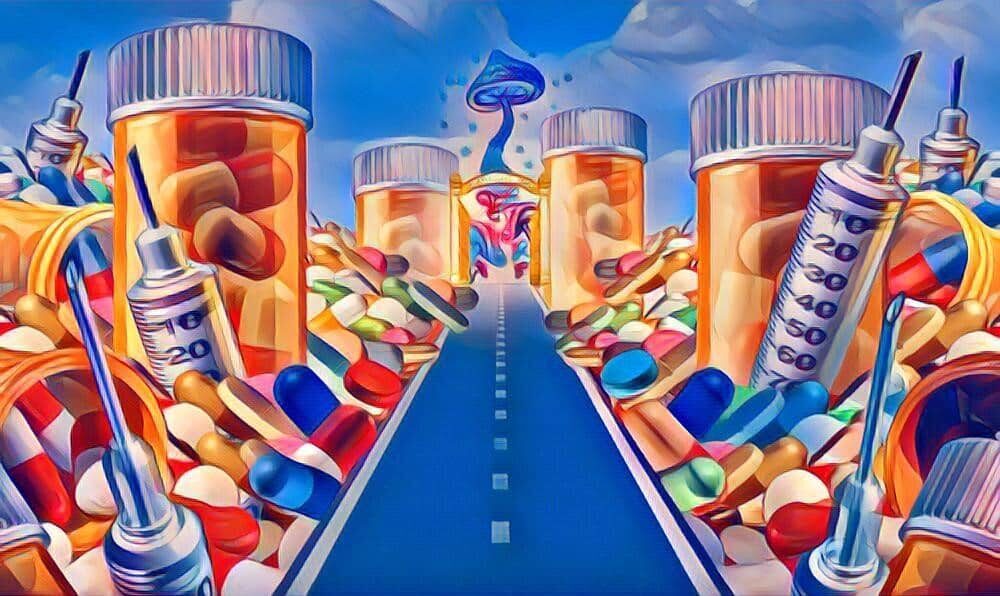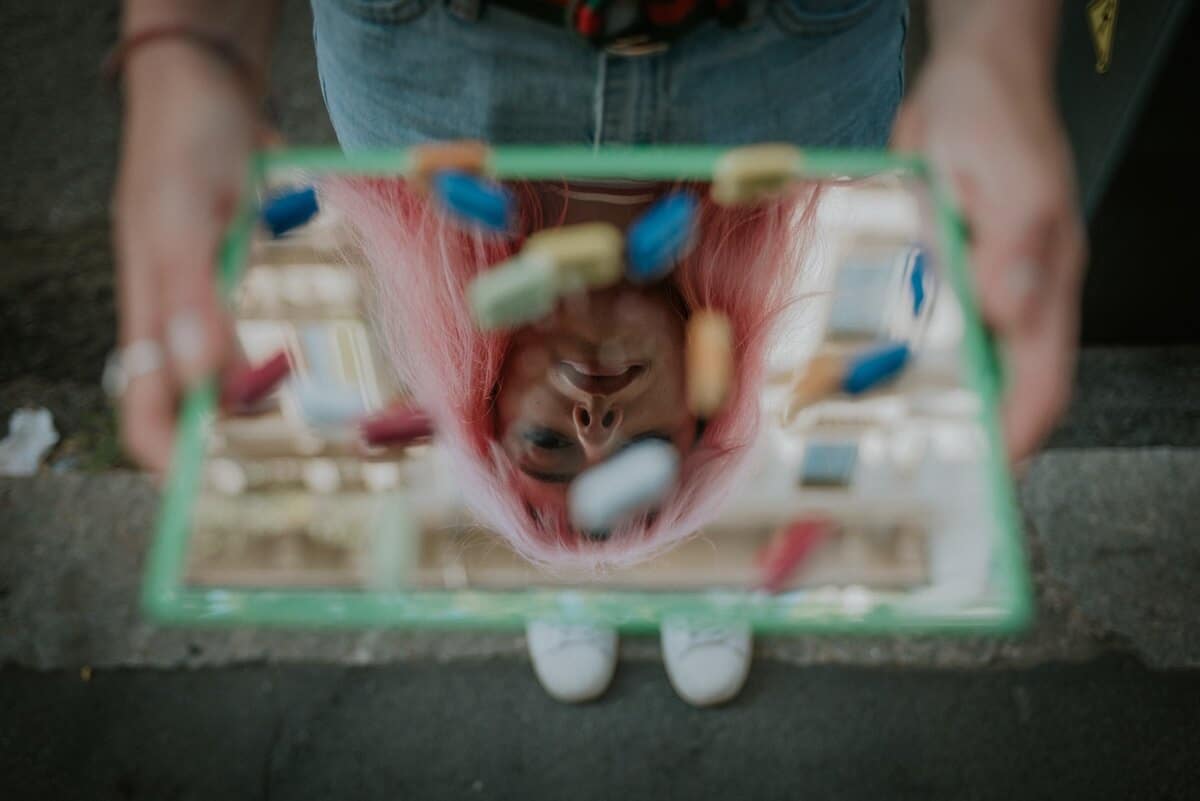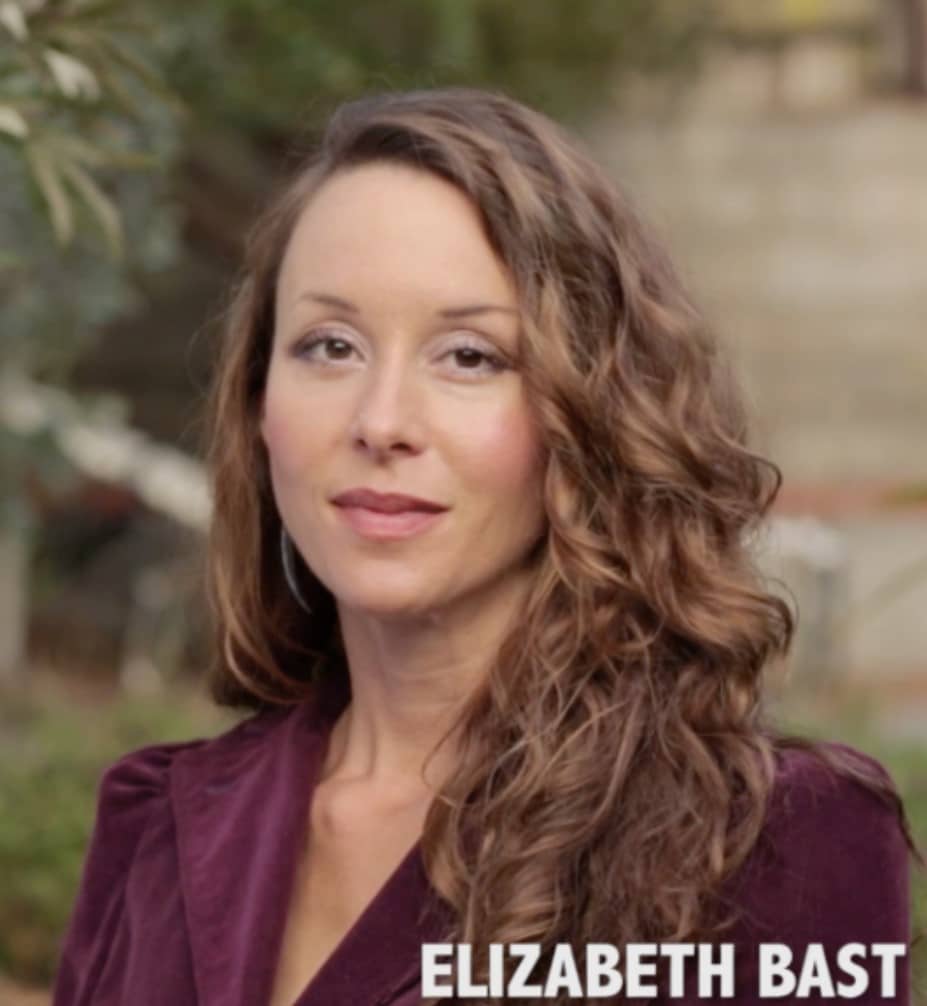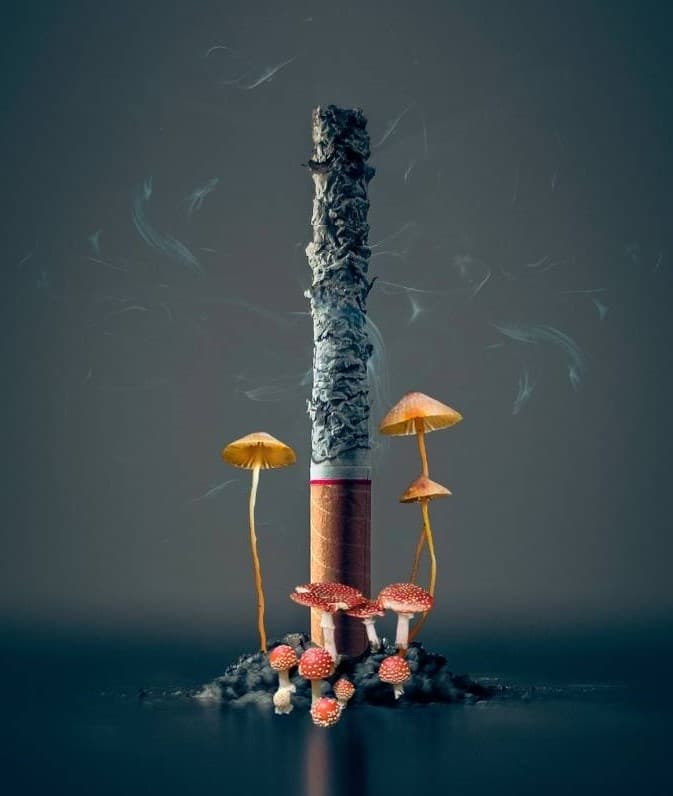Can Addiction Be Cured With Psychedelics?

More and more people have been using psychedelics for addiction treatment. But these powerful substances are no silver bullet – read on to learn how treating addiction with psychedelics really works, which substances have been found effective, and to what degree they can help.
Psychedelics such as psilocybin, ayahuasca, and iboga can catalyze profoundly meaningful spiritual experiences and open the doors to inaccessible areas of our psyche, especially when aided with psychotherapy.
While psychedelic experiences are relatively new for people from the Global North, many indigenous groups have been using psychedelic plants and fungi for healing for millennia. Over the last few decades, a growing body of research has emerged, proving the efficacy of these substances in resolving a variety of mental health conditions, which conventional pharmaceuticals have failed to adequately treat.
One of the areas where psychedelics are showing promise is addiction treatment. Numerous studies have shown links between a decreased risk of substance dependency in users of classic psychedelics, and millions of dollars are being poured into research on psychedelics for addiction treatment.
Psychedelic medicines assist people in healing their addictions on three levels: biochemical, psychological, and spiritual, according to researchers. People worldwide are discovering how psychedelics such as iboga/ibogaine, ayahuasca, psilocybin, and LSD can help them overcome their addictions by getting to the root of their suffering, healing past traumas, and establishing healthier patterns of behavior.
Psychedelic-Assisted Therapy Can Get to the Root of Addiction
The consensus on the root cause of addiction has shifted in recent years. Moving away from the belief that addiction is a disease caused primarily by a chemical dependency in the brain, mental health experts are now associating trauma and emotional pain with compulsive drug use.

Dr. Gabor Maté, whose well-known mantra is, “the question is not why the addiction, but why the pain,” is a leading thinker and researcher on this topic. He argues that the reason for a person’s addiction is to escape the pain that’s part of their daily lived experience, and which often stems from childhood trauma.
This argument has also been put forward by author Johann Hari, who states that “the opposite of addiction isn’t sobriety – it’s connection.” Hari argues that people’s social connections and quality of life – or lack thereof – drive them to seek comfort in addictive behaviors rather than a simple “chemical hook.”
Because psychedelics often take people back to the root cause of their suffering, allowing them to understand, process, and release it, they can help people break free of their addictions. Once the trauma is healed, the need to numb it or escape from it with substances or other compulsive behaviors is often gone or dramatically reduced.
So, which psychedelics are proving effective for addiction treatment – and how do they work?
Iboga/Ibogaine For Addiction
Perhaps the most well-known of all psychedelics for addiction treatment is iboga. Native to Central West Africa, specifically Gabon and Congo, iboga has a long history of and traditional use in the Bwiti culture.
Iboga’s main active compound, the alkaloid ibogaine, or ibogaine hydrochloride, is known to eliminate withdrawal symptoms from opioids, making detoxification significantly easier for people who use opioids like heroin.
This was evident in two observational studies, the first of which, conducted in Mexico, showed that ibogaine administration substantially reduced opioid withdrawal effects, with 33% of participants reporting no opioid use three months later.1
The second study, completed in New Zealand, found that ibogaine may have a significant pharmacological effect on opiate withdrawal, with participants experiencing reduced opioid use for up to twelve months following treatment.2
In addition to treating opiate addictions, many have reported that ibogaine helps to reduce cravings for narcotics and other substances, lowering the risk for continued drug abuse.
 But the healing power of iboga and ibogaine goes further than reducing withdrawal symptoms. “Iboga can help to heal addiction via deep physical, mental, and spiritual cleansing, neurogenesis, neuroplasticity, soul connection, and ancestral healing” explained Elizabeth Bast.
But the healing power of iboga and ibogaine goes further than reducing withdrawal symptoms. “Iboga can help to heal addiction via deep physical, mental, and spiritual cleansing, neurogenesis, neuroplasticity, soul connection, and ancestral healing” explained Elizabeth Bast.
Elizabeth is a Bwiti-trained Iboga Provider, Co-founder of SoulCentro, and faculty member of the Plant Spirit School Integration Coach Certification Program*, where students are learning how it might be possible to support clients with addiction recovery using psychedelics.
“What’s so beautiful about this medicine is that it can lead us to these places where we are healing our soul, where we are facing ourselves, facing our actions, and facing our fears,” she added.
An iboga initiation in the Gabon tradition provides a profound cultural and spiritual experience, whereas taking the isolated ibogaine extract in a clinical setting may be more effective for those experiencing opiate addiction and withdrawal symptoms.
*Are you feeling called to step into higher service and provide psychedelic integration support to others in their transformational experiences?
The Plant Spirit School Integration Coach Certification Program was designed to improve ceremony skills and leadership capacity in aspiring plant medicine integration, in a way that empowers them to turn their plant medicine experience into a thriving vocation.
- Receive essential education in psychedelic harm reduction and trauma-informed transformation
- Learn and practice a variety of ancestral and contemporary transformational tools
- Get proven strategies to create your transformational offer & grow your integration coaching practice
Learn more about the Plant Spirit School Integration Coach Certification program and claim your place as an integration specialist in the Psychedelic Renaissance!
Using Ayahuasca For Addiction Treatment
While ayahuasca does not work to halt withdrawal symptoms in the same way that ibogaine does, it has helped many people break free from addictions – whether from substance use disorders or other compulsive behaviors.
When taking ayahuasca, people are often confronted with past traumas and emotionally painful experiences, ultimately allowing them to release that pain and heal from it. “If someone goes down the path of abstinence, they may still have the strong compulsion to take the substance or drink because they haven’t addressed the root of the problem,” said Claire Quirk, coach, facilitator, and founder of ayahuasca retreat center Yagewaska.
“Ayahuasca helps people heal the trauma and pain that they’ve been through in their life that caused them to develop their addictive behaviors in the first place,” she added.
One study on ritual ayahuasca users in isolated and urban communities found that they are significantly less likely to become addicted to drugs and alcohol than non-users.3 Another survey of members of the Santo Daime church in the US found that people with past substance use disorders were no longer addicted, claiming that the ayahuasca sacrament was vital in their recovery.4
As well as digging into the trauma behind the addiction, researchers have also found that the ritual context of taking ayahuasca in community is a crucial part of the healing effort.5 The direction given to the multiple healing effects of ayahuasca by ritual “circumscribes the experience and provides tools to render it meaningful” for those undergoing addiction treatment.
Psilocybin-supported Addiction Recovery

Psilocybin is a powerful tool that helps people recovering from addiction process psychological pain and understand the subconscious processes behind their substance use or compulsive behaviors.
Psilocybin has been proven to be effective for treating nicotine addiction, and research into using psilocybin for smoking cessation was the first instance of psychedelic science receiving federal US funding in 50 years since the psychedelic research prohibition started.
One study, conducted by Roland Griffiths and his colleagues at Johns Hopkins Medicine, put the heavy smoker participants through 15 weeks of psychotherapy combined with three doses of psilocybin. After six months, 80% of participants were abstinent from smoking.6
Another recent study looked at data from over 214,000 US adults and found an association between past use of psilocybin and a reduced risk of opioid use disorder.7
Other Psychedelics For Addiction Treatment
Studies conducted on over 40,000 people between the 1950s and 1970s show that LSD holds promise as a treatment for alcoholism. In six clinical trials between 1966 and 1970, 81-100% of patients who received LSD as a treatment for alcohol addiction had remained abstinent at the first follow-up.
While much of our knowledge of how psychedelics support addiction recovery has come from clinical studies, indigenous groups, in particular Native Americans, have been treating addiction with psychedelics for much longer than the last couple of decades of research.
The Native American Church (NAC) has been successfully using peyote to treat alcoholism among its members.8 Peyote meetings have been able to facilitate new spiritual and social connections for NAC members and help them forge a new path and identity for themselves.
According to one study, “these traditions offer new kinds of power, social networks, and personal meaning that facilitate a transformation of self, a revitalized sense of community, and a new vision of the possibilities of the future for Navajo people who suffer.”9
Psychedelics Are Not a Magic Bullet

As with any change we seek to make in our lives, treating addiction with psychedelics is not a once-and-done solution because, on their own, these substances will not do the work for us. Proper preparation and post-journey integration are paramount to success – it’s no coincidence that multiple psychotherapy sessions are often a key part of the successful studies on psychedelic medicines.
“Ayahuasca is not a magic pill,” said Claire Quirk. “With preparation and integration, it’s about setting out a new path and a daily routine with things like meditation, journaling, coaching and/or therapy, spending time in nature, eating well, and exercise,” she explained.
“People who have successfully beat their addiction have been able to do so because they’ve integrated properly. However, there are some people who receive healing from the medicine, but then go back into their lives – to the same environment and social circles – and end up back in the same situation. It’s about integration with new communities and establishing support systems,” she added.
“People don’t stay sober by getting sober. People stay sober with inspiration and soul healing and soul-aligned visionary creativity,” said Elizabeth Bast. “It’s passion and purpose. That’s how people stay sober.”
So, can addiction be cured with psychedelics?

Psychedelics certainly hold huge promise for those who may be in the throes of addiction but want to heal and make changes in their life. While they must not be viewed as a magic bullet, using psychedelics for addiction treatment can help people identify the root of their pain, establish a stronger connection to themselves, their community, and spirit, and ultimately overcome their dependencies, provided that proper preparation and integration are part of the process.
Do you feel called to support the transformation of those going through addiction recovery?
Check out the Being True to You Addiction Recovery and Psychedelic Integration Coach Training Program taught by Deanne Adamson and Dr. Dan Engle.
References
- Brown, T., & Alper, K. (2017). Treatment of opioid use disorder with ibogaine: detoxification and drug use outcomes. The American Journal Of Drug And Alcohol Abuse, 44(1), 24-36. doi: 10.1080/00952990.2017.1320802
- Noller, G., Frampton, C., & Yazar-Klosinski, B. (2017). Ibogaine treatment outcomes for opioid dependence from a twelve-month follow-up observational study. The American Journal Of Drug And Alcohol Abuse, 44(1), 37-46. doi: 10.1080/00952990.2017.1310218
- Fábregas, J., González, D., Fondevila, S., Cutchet, M., Fernández, X., & Barbosa, P. et al. (2010). Assessment of addiction severity among ritual users of ayahuasca. Drug And Alcohol Dependence, 111(3), 257-261. doi: 10.1016/j.drugalcdep.2010.03.024
- Halpern, J. H., Sherwood, A. R., Passie, T., Blackwell, K. C., & Ruttenber, A. J. (2008). Evidence of health and safety in American members of a religion who use a hallucinogenic sacrament. Medical science monitor : international medical journal of experimental and clinical research, 14(8), SR15–SR22.
- Talin, P., & Sanabria, E. (2017). Ayahuasca’s entwined efficacy: An ethnographic study of ritual healing from ‘addiction’. The International journal on drug policy, 44, 23–30. https://doi.org/10.1016/j.drugpo.2017.02.017
- Johnson, M. W., Garcia-Romeu, A., Cosimano, M. P., & Griffiths, R. R. (2014). Pilot study of the 5-HT2AR agonist psilocybin in the treatment of tobacco addiction. Journal of psychopharmacology (Oxford, England), 28(11), 983–992. https://doi.org/10.1177/0269881114548296
- Jones, G., Ricard, J., Lipson, J., & Nock, M. (2022). Associations between classic psychedelics and opioid use disorder in a nationally-representative U.S. adult sample. Scientific Reports, 12(1). doi: 10.1038/s41598-022-08085-4
- ALBAUGH, B., & ANDERSON, P. (1974). Peyote in the Treatment of Alcoholism Among American Indians. American Journal Of Psychiatry, 131(11), 1247-1250. doi: 10.1176/ajp.131.11.1247
- Garrity J. F. (2000). Jesus, peyote, and the holy people: alcohol abuse and the ethos of power in Navajo healing. Medical anthropology quarterly, 14(4), 521–542. https://doi.org/10.1525/maq.2000.14.4.521
